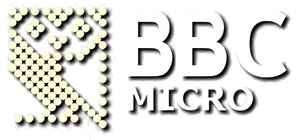BBC Micro: Difference between revisions
From WE Computers Museum
(fix Computer Literacy Project link) |
(add region) |
||
| Line 7: | Line 7: | ||
ram = Model A and B: 16-32 KB<br />Model B+: 64-128 KB<br />Master: 128 KB<br />32-128 KB ROM, up to 272 KB| | ram = Model A and B: 16-32 KB<br />Model B+: 64-128 KB<br />Master: 128 KB<br />32-128 KB ROM, up to 272 KB| | ||
media = [[Compact cassette]], [[floppy disk]] (optional)| | media = [[Compact cassette]], [[floppy disk]] (optional)| | ||
release = December 1, 1981| | release = United Kingdom: December 1, 1981| | ||
added_to_museum = Not yet| | added_to_museum = Not yet| | ||
}} | }} | ||
Revision as of 03:55, 24 August 2024

| |
| BBC Micro | |
| Designer | Acorn Computers, BBC |
|---|---|
| Manufacturer | Acorn Computers |
| CPU | 2 MHz MOS Technology 6512 |
| Graphics | 640×256, 8 colors |
| Memory | Model A and B: 16-32 KB Model B+: 64-128 KB Master: 128 KB 32-128 KB ROM, up to 272 KB |
| Media | Compact cassette, floppy disk (optional) |
| Released | United Kingdom: December 1, 1981 |
| Added to Museum | Not yet |
BBC Micro is a line of computers.
History
The British Broadcasting Corporation developed the BBC Computer Literacy Project beginning in 1979.
The BBC searched for a computer to headlight the computer and chose the successor to the Acorn Atom, codenamed the Proton. The BBC signed a contract with Acorn around February 1981, and in June, the final specifications for the BBC Micro were decided.
The BBC Micro Model A was released on December 1, 1981 and the Computer Literacy Project launched in March 1982.
Release
It was sold from December 1, 1981 to 1994.
Digital BBC Micro games owned by WEC Museum
| Title | Developer | Released | Notes |
|---|---|---|---|
| Snowvaders | Martin Hollis | 1984 | 2024 flicker-free version by Colin Hoad. |